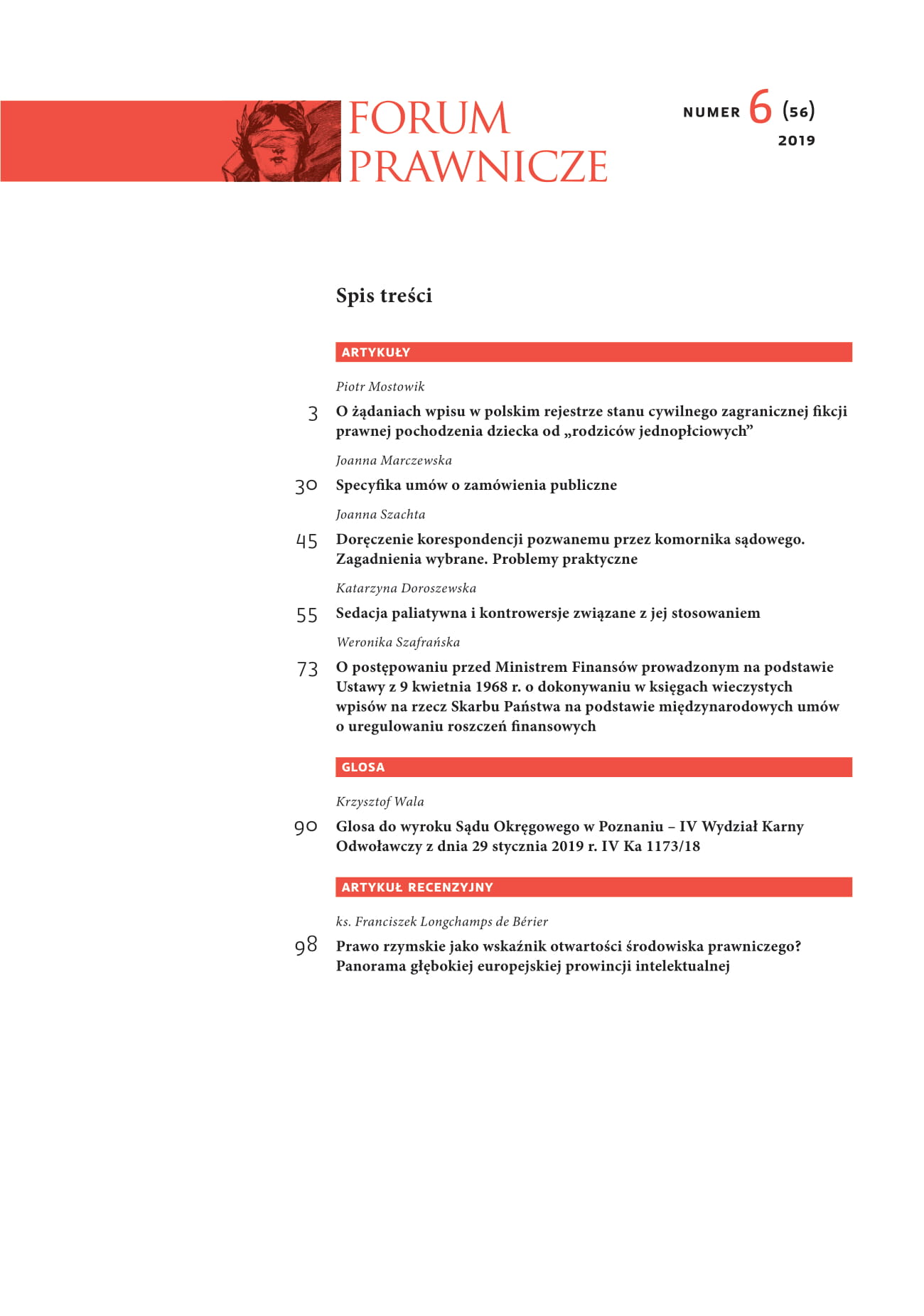Abstract
The Art. 1391 k.p.c. (Code of Civil Procedure) is a significant novelty, since such a solution has never been applied in the civil procedure before. It was pointed out how the regulation would affect the delivery of a document by a court bailiff. Attention was drawn to the amount of the fee and the contradiction between the statutory deadline for delivery by the enforcement authority and the statutory deadline for payment. The regulation determines the performance of service by the bailiff and the activities in the event of the unsuccessful service of documents to the defendant?s address. The proposalraises the problems resulting from the new regulation, including a wide scope of persons who may be authorized by the bailiff to perform the service. The regulation formulates the conditions which should be met by persons authorized by the bailiff to perform the service. Attention has been paid to the aspect of the lack of possibility to determine the whereabouts of the defendant by the bailiff; it was also considered whether the bailiff could obtain the information on the defendant's address from other proceedings in progress. It has been pointed out that the new regulation would lead to the extension of the examination procedure.
The proposed wording of the provisions on service has been formulated. The proposal included establishing a database of correspondence addresses of adult citizens in order to accelerate the proceedings and to eliminate the course of failures in services.
References
2. J. Jankowski, Uczestnicy sądowego postępowania egzekucyjnego, Łódź 1992.
3. G. Julke, Doręczenia w sądowym postępowaniu egzekucyjnym, PPE/5-6.
4. M. Klonowski, Kierunki zmian postępowania cywilnego w projekcie Ministra Sprawiedliwości ustawy o zmianie ustawy - Kodeks postępowania cywilnego oraz niektórych innych ustaw z 27.11.2017 r. - podstawowe założenia, przegląd proponowanych rozwiązań oraz ich ocena, PPC 2018/2.
5. M. Uliasz, Z. Woźniak, Doręczenia per aviso: niezasłużona krytyka, Rzeczposp. PCD 2012/11.
6. J. Sewerynik, Pisz do mnie na Berdyczów, czyli o doręczeniu per aviso, Rzeczposp. PCD 2012/10.
7. J. Świeczkowski, Doręczenie zastępcze w postępowaniu cywilnym, Gdańskie Studia Prawnicze, Tom XXXVI, 2016.
8. M. Świtkowski, Nowe zasady doręczania pism procesowych po reformie postępowania cywilnego z lipca 2019 r., LEX/el. 2019.
9. K. Weitz, Czy "dorosły" domownik w rozumieniu art. 138 § 1 k.p.c. musi być osobą pełnoletnią?, PPC 2010/1.
10. Postanowienie Sądu Najwyższego z dnia 8 grudnia 2010 r., III CZP 105/10, LEX nr 694257.
11. Postanowienie Sądu Najwyższego z dnia 2 lipca 2009 r., II UZ 20/09, LEX nr 468589.
12. Wyrok Trybunału Konstytucyjnego z dnia 15 października 2002 r., SK 6/02.
13. Opinia Ośrodka Badań, Studiów i Legislacji Krajowej Rady Radców Prawnych o projekcie ustawy o zmianie ustawy ? Kodeks postępowania cywilnego oraz niektórych innych ustaw z dnia 14 grudnia 2018 r. do druku nr 3137, s. 11. [online: https://www.sejm.gov.pl/Sejm8.nsf/druk.xsp?documentId=779D442720DC9D95C125838B0034E398].
14. Uzasadnienie do Rządowego projektu ustawy o zmianie ustawy - Kodeks postępowania cywilnego oraz niektórych innych ustaw, druk nr 3137.

